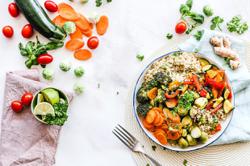Despite their taste, bitter foods like grapefruit can have many health benefits, including helping digestion. — dpa
What do chicory, grapefruit and Brussels sprouts have in common?
They contain substances that the bitter taste receptors on the tongue detect.
They’re healthy, so even if we find bitter foods unpleasant, it’s still a good idea to include them in your diet.
However, there is a reason why so many people dislike bitter foods.
”It’s something that’s innate and it helps keep us safe,” explains German University of Applied Sciences for Prevention and Health Management lecturer Christina Esser.
A bitter taste signals to us that something could be poisonous, e.g. many plants produce bitter substances to protect themselves from predators.
This explains why we usually don’t like our very first sip of coffee, and why many children hate Brussels sprouts.
But you can get used to bitter substances, and they can be good for us.
For example, the German Diabetes Aid Organisation says that bitter substances promote digestion.
They improve the production of stomach acid and bile, which makes it easier to digest fatty foods.
Bitter foods also reduce the feeling of hunger and reduce the desire for sweet things – an advantage especially for people with diabetes or who are overweight.
According to Esser, bitter substances also have an anti-inflammatory effect and can reduce the risk of heart disease.
If you want to incorporate more bitter substances into your diet, it’s best to do so step by step.
One tip is to combine bitter and sweet components.
“Lamb’s lettuce and radicchio mixed with pomegranate seeds and a savoury-sweet dressing is a tasty start,” advises Esser.
Of course, in some cases, bitter substances can indeed be harmful.
Caution is advised, for example, if courgette, cucumber or pumpkin taste bitter, says the German Diabetes Aid Organisation.
These vegetables shouldn’t taste bitter – if they are, it means they contain unwanted, toxic substances.
In this case, you should get rid of the vegetables.
If you eat grapefruit, or drink the juice, you should keep in mind that it can weaken or increase the effect of medication.
This applies, for example, to cholesterol-lowering drugs or medication for cardiovascular (heart) diseases.
Some dietary supplements are also based on extracts from plants that contain bitter substances. For example, you can get capsules with artichoke extract.
Nutrition specialist Astrid Tombek recommends opting for fresh vegetables rather than drops, capsules or tablets.
”It’s cheaper, tastier and better because of the other healthy ingredients they contain.”
Another thing to keep in mind is that overdoses can occur with dietary supplements.
If you eat the natural bitter substances from vegetables, herbs and salad, this won’t happen because of the bitter taste, which at some point becomes too much for us. – dpa





